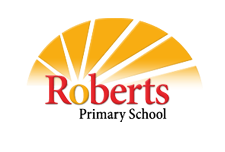Reading
Intent
At Roberts, we aim for children to be able to:
- Read easily, fluently and with good understanding
- Choose to read widely and often, both for pleasure and to learn from their reading
- Acquire a deep and broad vocabulary
- Appreciate a range of texts
- Use their reading to inform their writing
- Take part in discussions which deepen understanding, help them to learn and shape their opinions
- Understand what they have read by reading strategically
At Roberts we intend for every child to become a fluent, confident reader. We believe that with the right teaching and the right texts, every child can become a reader.
Key Components of our Reading Curriculum
- Phonics
- Daily Read Aloud
- Reading Comprehension
- Fluency
- Explicit and Incidental teaching of vocabulary
- Quality texts
How does reading teach British Values?
The British Values are:
- Democracy
- The rule of law
- Individual liberty
- Mutual respect for and tolerance of those with different faiths and beliefs
At Roberts, the texts that make up the reading curriculum provide opportunities to teach themes of tolerance, mutual respect and democracy. For example, in texts such as 'Floodland' children explore the concept of democracy, 'Wild Robot' explores themes including mutual respect whilst 'Fox Girl and the White Gazelle' and 'Front Desk' spark important conversations regarding tolerance, discrimination and diversity.
Furthermore, non-fiction texts have been carefully mapped to teach children about the British Values. For example, the rule of law is explored when children study a non-fiction text about Crime and Punishment whilst individual liberty is explored through texts such as 'How to Change the World'.
Texts are also mapped so that children explore other cultures and use their reading as a basis for discussion about diversity, tolerance and discrimination.
Implementation
Early Reading
At Roberts we know that it is essential that children learn to read accurately and automatically with appropriate fluency. Systematic, synthetic phonics is key to this. Therefore, Roberts use the Little Wandle Letters and Sounds Revised to teach early reading. We start teaching phonics in Nursery/Reception and follow the Little Wandle Letters and Sounds Revised progression, which ensures children build on their growing knowledge of the alphabetic code and develop the skills of segmenting, blending and phoneme manipulation.
Phonics
We teach phonics for 30 minutes a day. In Reception, we build from 10-minute lessons, with additional daily oral blending games, to the full-length lesson as quickly as possible. Each Friday, we review the week's teaching to help children become fluent readers.
In Reception are taught to read and spell words using Phase 2 and 3 GPCs, and words with adjacent consonants (Phase 4) with fluency and accuracy.
Children in Year 1 review Phases 3 and 4 and are taught to read and spell words using Phase 5 GPCs with fluency and accuracy.
Reading Practice
Children are then taught to apply their phonics knowledge and skills during reading practice sessions. There are three reading practice sessions a week. These sessions are delivered to small groups of children by full trained adults. The Little Wandle Assessment Tracker is used alongside teacher assessment to select texts which are appropriately matched to children's current phonics attainment.
The reading practice sessions have been designed to focus on three key reading skills:
- decoding
- prosody: teaching children to read with understanding and expression
- comprehension: teaching children to understand the text.
At the end of each week, children take home the book they have practised with to read to an adult at home.
As well as word reading, language comprehension is also taught. Children are read to daily by an adult and participate in book talk conversations, discussing their likes, dislikes, puzzles and predictions. In Year 2 children review Phase 5 content and then progress to the Little Wandle Fluency programme.
For information about how to support children's phonics at home, visit the Little Wandle website:
https://www.littlewandle.org.uk/resources/for-parents/
Reading in Key Stage 2
In Key Stage 2 children have daily reading lessons. The teaching of reading is based upon research and evidence informed practice into the teaching of comprehension, fluency and vocabulary.
Children are generally taught as a whole class; however, teachers will use their assessment for learning to teach in groups and 1-1 as necessary.
In Key Stage 2, comprehension strategies are taught so that children can read strategically. Children also engage in discussions about their reading. They are taught to think deeply about their reading and engage in discussions with their peers and adults about what they have read.
The reading curriculum has been planned to ensure that there are a variety of representations in the literature that children read, as well as a balance of poetry, non-fiction and fiction. Furthermore, non-fiction texts have been selected to develop children's background knowledge, deepen their understanding of fiction texts and develop their knowledge of how expository texts are structured. Texts are deliberately challenging so that they are worthy of deep discussion and investigation and shape children as readers and citizens.
Reading Spine
Children at Roberts are read aloud to daily. Research shows that daily read-aloud sessions have a huge impact on children's language development, vocabulary, and comprehension skills. Listening to stories exposes pupils to rich and varied language they might not yet encounter in their own independent reading. It also helps them hear how fluent, expressive reading sounds, which they can then model in their own voices. We also know that children and adults love sharing and listening to stories.
The texts that we read aloud to children are mapped to ensure that we share the finest literature with our children.
Nursery Reading Spine
|
Burglar Bill |
Whatever Next! |
Rosie's Walk |
Dear Zoo |
You Choose |
The Train Ride |
Farmer Duck |
|
Shark in the Park |
Shhhh! |
Handa's Surprise |
Hair McClary |
Brown Bear, Brown Bear |
Each Peach Pear Plum |
Jasper's Beanstalk |
|
The Gruffalo |
Peace at Last |
Dear Greenpeace |
|
|
|
|
Reception Reading Spine
|
The Jolly Postman |
Pumpkin Soup
|
Sweep |
Along Came a Different |
Luna Loves Art |
I Don't Want Curly Hair |
Solomon Crocodile |
|
Here We Are |
Tad |
Anansi and the Golden Pot |
The Emperor's Egg |
The Best Diwali Ever |
Martha Maps it Out |
Stuck |
|
Elmer |
The Tiger Who Came to Tea |
Clean Up! |
The Lighthouse Keeper's Lunch |
Lost and Found |
The Worrysaurus |
The Bumblebear |
|
Owl Babies |
The Squirrels Who Squabbled |
Mr Wolf's Pancakes |
The Rainbow Fish |
Chicken Clicking |
Aliens Love Underpants |
The Odd Egg |
|
Giraffes Can't Dance |
The Same but Different Too |
Tadpole's Promise |
Not Now, Bernard |
This Zoo is not for you |
The Bog Baby |
Oi Frog! |
Year 1 Reading Spine
|
The Wild |
The Big Book of Why |
All Are Welcome |
The Day the Crayons Quit |
Do You Love Bugs |
An Engineer Like Me |
Tadpole's Promise |
|
A Cautionary Tale of Jim |
Good Little Wolf |
Little Red |
The Last Wolf |
Grandma Bird |
Mixed |
The Colour Monster |
|
Beegu |
We're All Wonders |
The Most Megnificent Thing |
The Secret Garden |
Meerkat Mail |
Betsy Buglove Saves the Bees |
Look Up! |
|
Mrs Noah's Pockets |
Cinnamon |
Pattan's Pumpkin |
Beautiful Oops |
The King Who Banned the Dark |
The Storm Whale |
The Thing |
|
The Worrying Worries |
The Truth Pixie |
The Seasaw |
On Sudden Hill |
The Lion Inside |
Can I Build Another Me |
Ruby's Worry |
Year 2 Reading Spine
|
The Giving Tree |
Yours Sincerely, Giraffe |
The Hodgeheg |
The Griffin Gate |
Einstein the Penguin |
The Thing at 52
|
Fantastical about Frogs |
|
India Incredible India |
The Great Fire of London |
Ossiri and the Bala Mengro |
Counting on Katherine |
Emperor of the Ice |
Frontiers of Space |
Pandora and the Story Forge |
|
The Midnight Panther |
The Rainbow Bear |
Lila and the Secret of Rain |
After the Fall |
The Barnabus Project |
The Night Gardener |
The Emerald Forest |
|
Factopia |
The Egyptian Cinderella |
Everything Under the Sun |
Troll Stinks |
Once Upon a Raindrop |
The Big Book of the UK |
Gorilla |
|
Darwin's Super Pooping Worm Spectacular |
The Rhythm of the Rain |
Traction Man |
Aaron Slater Illustrator |
Rain Before Rainbows |
Leaf |
It's a No Money Day |
|
The Search for the Giant Arctic Jellyfish |
How to Help Hedgehogs and Protect a Polar Bear |
Until I Met Dudley |
The Proudest Blue |
The Promise |
There's a Rang-tan in my bedroom |
|
Key Stage 2 Reading Spine
|
|
Autumn 1 |
Autumn 2 |
Spring 1 |
Spring 2 |
Summer 1 |
Summer 2 |
|
Year 3 |
The Iron Man
|
The Wild Robot
|
Charlotte's Web
|
Owen and the Soldier
Race to the Frozen North
|
The Girl who Stole an Elephant
|
The Abominables
|
|
Year 4 |
Podkin One Ear
|
Journey to Jo'Burg
|
Beetle Boy
|
The Lion, The Witch and the Wardrobe
|
Odysseus (x 1 story)
|
Blackberry Blue (x1 story)
The Eye of the Wolf |
|
Year 5 |
Floodland
|
The Nowhere Emporium
|
Fox Girl and the White Gazelle
|
Wolf Brother
|
Beowulf
Cloud Busting |
The Umbrella Mouse
|
|
Year 6 |
When the Sky Falls
|
The Shark Caller
|
Skellig
|
Front Desk
|
Holes
|
The Final Year
Clockwork |
Impact
Reading will be assessed by:
- NFER Termly Assessments. Results are inputted and are tracked by the leadership team, analysed and explored further during Pupil Progress Meetings and used to set intervention groups and targets.
- Dibels Oral Reading Fluency Assessments
- Herts for Learning Fluency Project analysis
- Little Wandle Assessments
- Phonics Screen Check Results
- Key Stage 1 and Key Stage 2 SATs
- Pupil voice and surveys
- Quality Assurance of reading by English Lead during data entry periods
Reading at Home
We have different books that will come home during your child's time at Roberts.
Decodeables
These are the Little Wandle Phonics books. They are matched to where children are currently working at in phonics. Children read the book with an adult three times in school and then will bring the book home to read to an adult. Children should be able to read with a high degree of accuracy and fluency.
These books are changed weekly.
Fluency Books
When children have completed the Little Wandle Phonics programme, they move on to the Little Wandle Fluency programme. The aim of these books is to develop children's fluency and reading stamina. The books offer more of a challenge than the phonics books and are organised into chapters. Children read the book with an adult three times in school and then will bring the book home to read to an adult.
These books are changed fortnightly.
Book Banded Library Books
Once children have completed the fluency books, they will be able to choose a book from the library. Books are banded so that teachers can guide children to choose from a selection which they know is appropriate for the child's age and currently reading attainment. There are a range of books to choose from including fiction, non-fiction, short stories, graphic novels and poetry. Children will not move through the coloured bands quickly as the focus is on depth and breadth: we want children to read a wide range of books with a high degree of accuracy before moving on to the next book band.
Brown = Year 3
Silver = Year 4
Navy = Year 5
Burgundy = Year 6
As a guide, in Years 3 and 4, children will keep a book for two weeks. In Years 5 and 6 children will keep a book for 3 weeks. Children read aloud their book a minimum of once a week to an adult in school.
Libraries and Reading for Pleasure
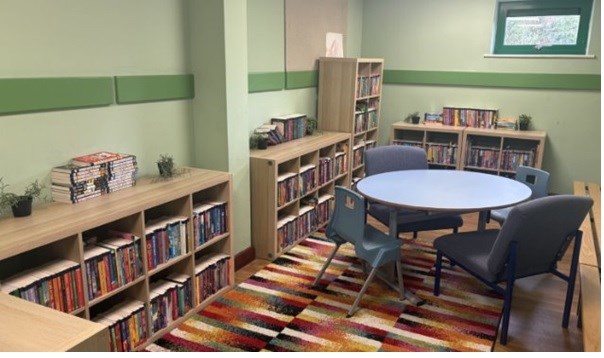
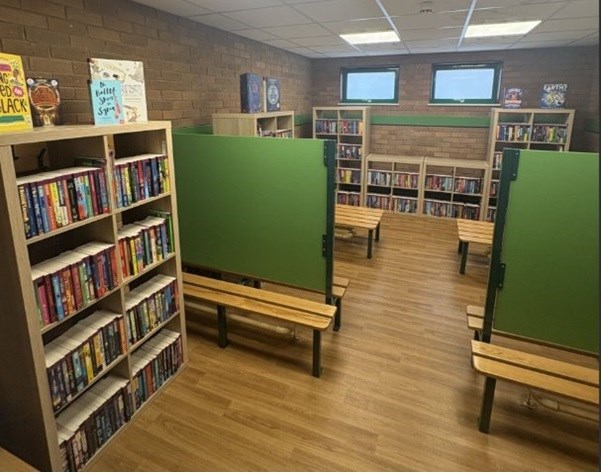
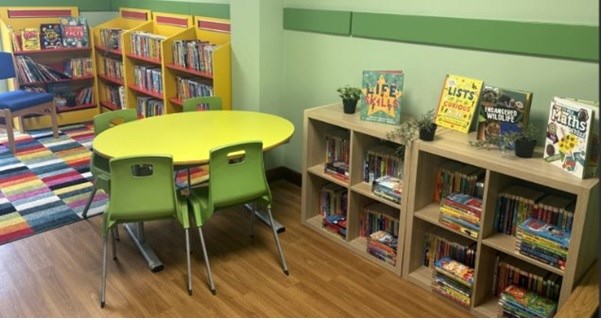
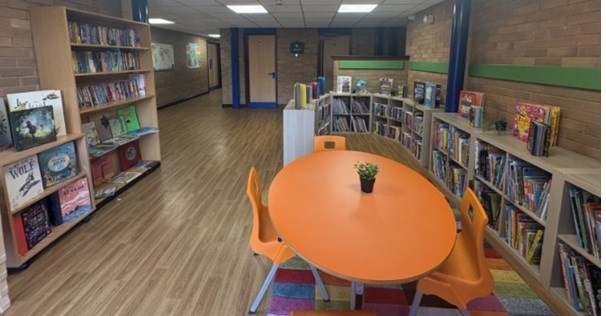
At Roberts, we know that reading is one of the most important skills a child can develop – and when children read for pleasure, the benefits are even greater. Research shows that children who enjoy reading every day not only do better in reading tests but also perform better across the curriculum.
The impact goes far beyond the classroom. Reading sparks imagination, builds empathy, and helps children to understand the world around them. It can also support wellbeing, offering a chance to relax, escape, and enjoy a quiet moment.
As a result, at Roberts, we make reading a priority. We have dedicated library spaces around school that are filled with a wide variety of books so every child can find the book that makes them a reader. We want every child to leave Roberts with a love of reading that will last a lifetime.
Every child in school will choose a library book to bring home and enjoy.
The following websites are all great sources of inspiration to help you find the right books for your child:
The Reader Teacher
https://www.thereaderteacher.com/
Books for Topics
https://www.booksfortopics.com/
CLPE
https://clpe.org.uk/books/booklists
Love Reading 4 Kids
